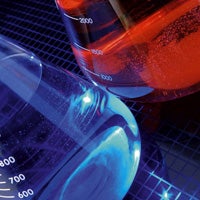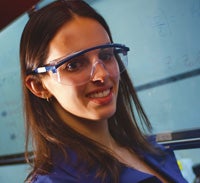Chemistry—Essential 2 Rhode Island’s Future


The Bond Referendum – Question #2
The Higher Education Facilities Bonds. Approval of this question will allow the State of Rhode Island to issue general obligation bonds, refunding bonds, and temporary notes in an amount not to exceed sixty-one million dollars ($61,000,000) for the construction of a new chemistry building at the University of Rhode Island, and seventeen million dollars ($17,000,000) for the renovation and construction of an addition to the Art Center at Rhode Island College.
“Chemistry is the foundation to practically every important area of endeavor, whether it’s the health sciences, biotechnology, energy, the environment, pharmacy, nursing or high technology,” says URI President David M. Dooley. “As Rhode Islanders who are interested in the education of their children and in the economic future of the state head to the polls on November 2, we want them to remember that chemistry is the building block, the bedrock foundation.”
On Election Day, Rhode Islanders will be asked to vote on a $78 million higher education bond referendum (#2) that includes $61 million to finance a modern chemistry facility at URI.
“We cannot rebuild Rhode Island’s economy without rebuilding Rhode Island’s capacity in the 21st century, and that’s what we’re asking the voters to do in this election,” Dooley says.
The president adds, “As we look to combat disease, improve the health of Rhode Islanders, Americans, and people around the world; as we look for solutions to the global need for energy and sustainable development; as we look to provide better efficiency and higher productivity in many of our core industries, what you will find is that research and education in the chemical sciences is absolutely essential.”
Completes Health and Life Sciences Quad

“We’re not just asking to build a physical infrastructure with leading edge teaching and research space, we are asking to build the sustainable supply of human talent and human ingenuity that is necessary to drive innovation, to drive the frontiers forward in research and discovery.”
URI President David M. Dooley
The new Center for Chemical and Forensic Sciences will replace the outmoded and nearly 60-year-old Pastore Hall, which opened in 1951 when 800 students took chemistry courses each year. Today more than 6,000 students enroll in chemistry courses, and about 40 percent of all URI degree programs require at least one course in chemistry.
The Center will also be the keystone in the establishment of the University’s leadership position in the health and life sciences as it joins the new College of Pharmacy, the Center for Biotechnology and Life Sciences, and the College of Nursing in the new North Science Quad on the Kingston Campus.
“The development of the North Science Quad was conceived about five years ago as a way to build community among scholars,” says Vice President for Administration Robert Weygand. “It will physically and socially connect the health and life sciences faculty and students to increase opportunities for collaboration, strengthen multi-disciplinary research, and expand relationships with corporate partners and other institutions.”
Twice the size of Pastore, the new 120,000-square-foot, four-story Center will triple the space for teaching labs and nearly double the research lab space. The total student capacity in laboratories will increase by more than 50 percent, from 1,200 to 1,900 students per semester, addressing a critical bottleneck that has hampered growth in pharmacy, biotechnology, engineering, and many other fields.
Drives the Research Frontier

Chemistry: The Bedrock Foundation
The following degree programs require at least one chemistry course:
Animal Science and Technology
Aquaculture and Fishery Technology
Biological Sciences
Biotechnology Manufacturing
Clinical Laboratory Science
Engineering (all disciplines)
Geosciences
Kinesiology
Marine Biology
Microbiology
Nursing
Nutrition and Dietetics
Pharmaceutical Sciences
Pharmacy (PharmD)
Pre-dental and Pre-Medical
Textile, Fashion Merchandising, and Design
Wildlife Conservation Biology
“We’re not just asking to build a physical infrastructure with leading edge teaching and research space, we are asking to build the sustainable supply of human talent and human ingenuity that is necessary to drive innovation, to drive the frontiers forward in research,” says Dooley.
URI chemistry faculty are already leaders in research, developing advanced batteries for energy efficient automobiles, new ways to improve image resolution in MRI scans, and new clinical methods for earlier disease detection. They are also among the nation’s key resources for research and training in the detection of explosions and the battle against terrorism. Chemistry faculty head the Department of Homeland Security Center of Excellence in Explosives, partnered with Northeastern University and headquartered at URI.
“We are developing intellectual property that will help drive the economic engine for Rhode Island and improve our quality of life. This facility will allow faculty to compete more effectively for grants and move scientific discoveries into the marketplace more rapidly,” says Winifred Brownell, dean of the College of Arts and Sciences.
“Modern facilities energize students and faculty alike,” adds William Euler, professor and chair of the Department of Chemistry. “All of our talented young faculty were attracted to URI, in part, by the possibilities with such a facility—to be able to train our undergraduate and graduate students in a cutting-edge environment, while tackling significant scientific and technological problems. Students and potential students are enthused because they know it will provide them the best experience to compete and succeed in the job market.”
“People do ask how this project is connected to creating jobs in Rhode Island,“ says Dooley. “My response is that in addition to building the 21st century workforce in the state, we need to build the capacity to generate new employers—that’s how you create new jobs. The kind of activity that will take place in this facility will encourage innovation and the application of those discoveries—the pathway to new growth in economic development.
“The building is designed to last 100 years,” adds Dooley, “and chemistry will continue to be the science behind many of the frontiers that will be so important into the next century.”

 Home
Home Browse
Browse Close
Close Events
Events Maps
Maps Email
Email Brightspace
Brightspace eCampus
eCampus


